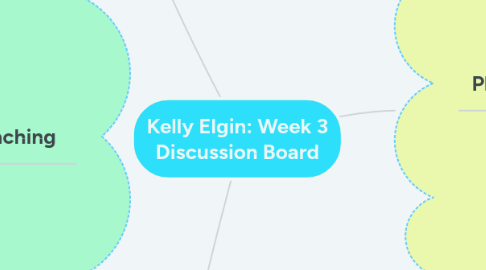
1. Assessment
1.1. Formative Assessment
1.1.1. Assessments that are completed during a unit. These assessments are ongoing and are not always considered formal.
1.2. Summative Assessment
1.2.1. A summative assessment is used at the end of a unit to show all of the learning that has taken place during that time.
1.3. Student Self-Assessment
1.3.1. Students can gauge their own learning by self assessing. This can be done with teacher support and knowledge of learning goals and expectations.
2. Philosophies
2.1. Self-Actualization
2.1.1. In order for a student to achieve highest success, their basic human needs must be met. Abraham Maslow states that this is a term for fulfilling one's human potential.
2.2. Cognitive Processing
2.2.1. The purpose of school is to continue to develop each students' higher-level thinking skills.
2.3. Academic Rationalism
2.3.1. The purpose of school is to relay important concepts, truths, and values. The teacher is in place to share their wealth of knowledge.
2.4. Curriculum as Technology
2.4.1. The systematic and organized way of delivering content. This direct instruction method divides information into smaller pieces in order to gain long term learning.
2.5. Social Reconstructivism
2.5.1. Social reconstructionists believe that the role of a teacher is to instruct and aid students in solving the problems of society. This philosophy has a more political role. Instead of focusing on the basic subjects, schools are expected to push students into thinking about political topics such as poverty, racism, health issues, etc.
3. Models of Teaching
3.1. Direct Instruction
3.1.1. Model of teacher-directed lesson that is structured as a series of steps. A more traditional model seen in classrooms.
3.2. Concept Attainment:
3.2.1. The lessons promote students' cognitive skills when given characteristics that are a part of a set.
3.3. Inductive Model:
3.3.1. Student-driven model where the students are in charge of their own learning. They observe, analyze, and evaluate data to achieve a conclusion.
3.4. Reciprocal Teaching:
3.4.1. A student-led teaching style where the teacher exchanges roles with the student. This is specifically helpful in reading. Students are led to ask questions, make predictions, and summarize throughout their learning.
4. Standards
4.1. Content Standards
4.1.1. Decide what students should know or be able to do within a specific content area. These standards provide a general guide or framework for a content area.
4.2. Performance Standards
4.2.1. Describes the levels of student performance in regard to a specific benchmark.
4.3. Lifelong-Learning Standards
4.3.1. Skills and processes that are required in various content areas.

